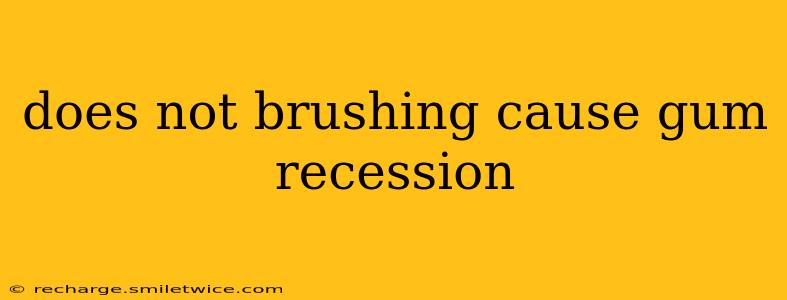Gum recession, that dreaded process where your gums pull back, exposing more of your teeth, is a serious concern. It can lead to tooth sensitivity, tooth loss, and even impact your overall oral health. Many wonder if neglecting oral hygiene, specifically not brushing, is a primary culprit. The short answer is: yes, not brushing your teeth significantly contributes to gum recession. Let's delve deeper into why.
How Does Not Brushing Lead to Gum Recession?
The primary mechanism linking poor brushing habits to gum recession lies in the build-up of plaque and tartar. Plaque, a sticky film of bacteria, constantly forms on your teeth. If not removed through regular brushing and flossing, it hardens into tartar, a rough, calcified substance. This tartar irritates the gums, causing inflammation – the hallmark of gingivitis.
Over time, this chronic inflammation damages the tissues and bone that support your teeth. This damage weakens the attachment between your teeth and gums, leading to the gradual recession of the gum line. Essentially, the gums are literally being pushed back by the ongoing infection and inflammation.
What Other Factors Contribute to Gum Recession?
While neglecting brushing is a major factor, it's crucial to understand that gum recession isn't solely caused by poor oral hygiene. Other contributors include:
Aggressive Brushing:
Ironically, brushing too hard with a hard-bristled toothbrush can also cause gum recession. This abrasive action damages the gum tissues, leading to their retreat. Gentle brushing with a soft-bristled brush is key.
Genetics:
Some individuals are genetically predisposed to gum recession. Family history of gum disease increases your risk.
Hormonal Changes:
Fluctuations in hormone levels, particularly during pregnancy or menopause, can make gums more susceptible to inflammation and recession.
Grinding or Clenching Teeth (Bruxism):
This habit puts excessive pressure on the teeth and gums, contributing to recession.
Smoking:
Smoking impairs blood flow to the gums, hindering their ability to heal and making them more vulnerable to recession.
Certain Medical Conditions:
Some medical conditions, such as diabetes and certain autoimmune diseases, can increase the risk of gum disease and subsequent recession.
How Can I Prevent Gum Recession?
Preventing gum recession is largely about proactive oral hygiene and regular dental check-ups. Here's what you can do:
Brush Gently Twice a Day:
Use a soft-bristled toothbrush and gentle, circular motions.
Floss Daily:
Flossing removes plaque and food particles from between your teeth, where your toothbrush can't reach.
Use Antibacterial Mouthwash:
This can help control bacteria and reduce inflammation.
See Your Dentist Regularly:
Professional cleanings remove tartar buildup that you can't remove at home. Early detection and treatment of gum disease are vital in preventing further recession.
Consider a Mouthguard:
If you grind or clench your teeth, a mouthguard can protect your teeth and gums.
Does Not Brushing Always Cause Gum Recession?
While not brushing significantly increases your risk, it doesn't guarantee gum recession. Genetic predisposition and other factors play a role. However, neglecting brushing drastically increases your chances of developing gingivitis and periodontitis, both of which are major causes of gum recession.
How Can I Tell if I Have Gum Recession?
Notice any of these signs? See your dentist immediately:
- Longer-appearing teeth: This is the most obvious sign.
- Sensitive teeth: Exposed roots are more sensitive to hot, cold, sweet, or sour foods.
- Bleeding gums: While sometimes normal, persistent bleeding is a warning sign.
- Loose teeth: Gum recession weakens the support for your teeth.
- Persistent bad breath: This can indicate underlying gum problems.
By practicing excellent oral hygiene and seeing your dentist regularly, you can significantly reduce your risk of gum recession and maintain a healthy smile for years to come. Don't underestimate the importance of regular brushing!
